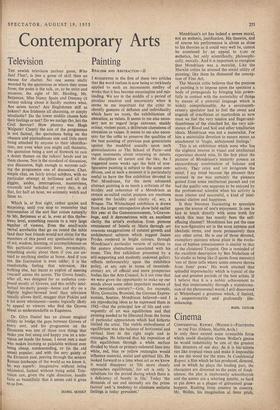Contemporary Arts
THE newish television parlour game, Who Said That?, is less a game of skill than an excuse for chatter. No one seems really worried by the quotations or where they come from; the point is the talk, or, to be strict and accurate, the sight of Mr. Harding, Mr. Betjeman, Miss Nancy Spain and Dummy (it varies) talking about it hardly matters what. Are saints bores? Are Englishmen stiff as pokers? Are Irishmen all charming, or simply unreliable? Do the lower, middle classes hide their feelings or not? Do we malign (ho, ho) the Civil Service? How phoney was Hugh Walpole? Clearly the aim of the programme is not factual, the quotations being on the obscure and platitudinous side and little merit being attached by anyone to their identifica- tion; nor even what you might call thematic, the quotation being a sort of firework to rain a dozen themes on the talkers' heads and let them choose. Nor is the standard of discussion, qua discussion, high enough to warrant call- ing the programme one of discussion. Chat, simple chat, on fairly trivial subjects, with no Particular attempt at brilliance and all the giggles, asides, interruptions, mannerisms, crosstalk and backchat of every day, is all that, for half an hour, we solemnly watch and listen to.
Which is, at first sight, rather quaint and surprising; until you stop to remember that conversation of the sort that comes naturally to Mr. Betjeman et al. is, even at this thr6- away level, something remote to a very large ntimber of viewers. Even the small-scale verbal acrobatics that go on round the table (and their best friends would not claim for the members of this panel any spectacular degree of wit, wisdom, learning, or accomplishment on this particular occasion) have, presumably, something exotic about them if you are un- used to anything similar at home. And if you are, the fascination is even odder; it is the comfortable feeling that television, like nothing else, has learnt to exploit of meeting Yourself across the screen. The Grove family, after all, was designed for an audience com- posed mostly of Groves; and this mildly intel- lectual tea-party gossip—home and dry on a slightly higher-browed level than television usually allows itself, snugger than Pickles and a lot more wholesome—seems logically likely to appeal to viewers who find the Groves about as understandable as Esquimos.
Dr. Glyn Daniel has an almost magical ability to bridge the gaps between Groves of every sort, and his programme on the Etruscans was one of those rare things that make you feel smug and happy you let a tele- vision set inside the house. I never met a man Who makes learning so palatable without ever being cheap, condescending, or (in the old sense) popular; and with the eery gaiety of the Etruscan past, peering through the severer Roman landscape of the world as we know it, he was superb ; imaginative without being whimsical, factual without being solid. Tele- vision can, given the right direction, handle facts so beautifully that it seems odd it gives us so few.
ISABEL QUIGLY


































 Previous page
Previous page